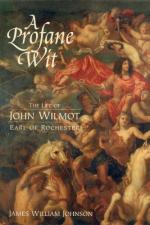|
This section contains 5,786 words (approx. 20 pages at 300 words per page) |

|
SOURCE: Fujimura, Thomas H. “Rochester's ‘Satyr Against Mankind’: An Analysis.” Studies in Philology 55 (October, 1958): 576-90.
In the essay below, Fujimura argues that A Satire Against Mankind is divided into two parts, that the first, which deals with epistemology, favors sensory-based “right reason” over speculation, and that the second part, which deals with moral satire, emphasizes the baseness and fear-driven nature of human conduct.
The Earl of Rochester's Satyr Against Mankind is generally regarded as a powerful satire and an intimate revelation of a striking personality; but beyond this, there is little unanimity of opinion—either as to its originality or its meaning. Probably as a result of this disagreement, the poem has not received the attention it deserves.1
One obstacle to the appreciation of the poem has been the question of its originality: here the opinions range from the verdict that everything in the poem is borrowed to...
|
This section contains 5,786 words (approx. 20 pages at 300 words per page) |

|


